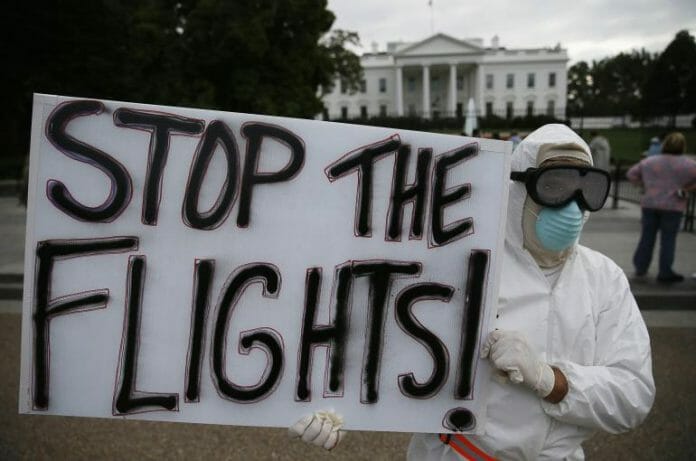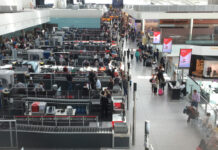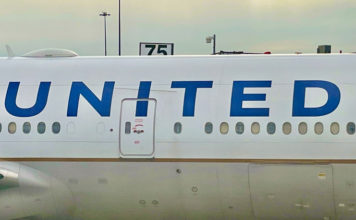
TravelingForMiles.com may receive commission from card issuers. Some or all of the card offers that appear on TravelingForMiles.com are from advertisers and may impact how and where card products appear on the site. TravelingForMiles.com does not include all card companies or all available card offers.
My thoughts in this post are firmly directed at people who seem to be incapable of seeing past the 24-hour news frenzy that’s surrounding the current Ebola outbreak. Worryingly, these same people also seem to be incapable of thinking for themselves and appear to want to jump on every over-blown, over-the-top and often nonsensical suggestion emanating from the news media. It’s time for a bit of sense to prevail.
Let’s start with some of the suggestions we’ve been hearing that purport to be the best way to protect the US from Ebola:
1) US Airport screening of all passengers from West Africa: This is a pointless, expensive, waste of money and nothing more than window dressing put forward by politicians to offset the hysteria being built up by the media.
Passengers leaving West Africa are routinely screened for Ebola anyway, so I’m not sure what screening at US airports is expecting to pick up that hadn’t been picked up at departure. For those wanting to play the “Developing countries can’t screen as well as we can” card, I’d advise that you save your breath. From the whitehouse.gov website:
Exit screening measures are routinely implemented in the affected West African countries, and U.S. government personnel have worked closely with local authorities to implement these measures. Since the beginning of August, CDC has been working with airlines, airports, ministries of health, and other partners to provide technical assistance for the development of exit screening and travel restrictions in countries with Ebola. This includes:
- Assessing the capacity to conduct exit screening at international airports;
- Assisting countries with procuring supplies needed to conduct exit screening;
- Supporting with development of exit screening protocols;
- Developing tools such as posters, screening forms, and job-aids;
- Training staff on exit screening protocols and appropriate personal protective equipment (PPE) use; and,
- Preparing in-country staff to provide future trainings.”
To put my point more simply: if you don’t think US led/backed screening in West African airports is effective how effective do you think US screening on home soil is going to be?
In addition, we’re discussing 21st century air travel here and not 17th century ocean crossings – the chances of someone not showing symptoms at departure but then showing them a few hours later upon arrival in the US is pretty minimal, so that’s not much of a reason to screen at US airports, either.
The fact is that airport screening, regardless of where it takes place, is certainly not going to be how we stop Ebola. Per the World Health Organization: “The incubation period, that is, the time interval from infection with the virus to onset of symptoms [of Ebola] is 2 to 21 days“, so there’s more than a good chance that someone with the virus will not be showing symptoms whichever airport they’re screened at.
Apparently the government has thought of this, so they’ve come up with another plan. The New York Times tells us that:
“All other nonsymptomatic travelers can expect to be monitored as all travelers have been under a plan announced last week: state and local health departments will check in every day for the 21 days following their departure from West Africa, the length of time in which Ebola can remain dormant.“
How, exactly, do the government and local healthdepartments expect to monitor all travelers “every day for the 21 days following their departure from West Africa“? There isn’t an infrastructure in place that can handle anything close to that task – it’s nonsense.
As I said earlier, airport screening (and other token efforts) are nothing more than a expensive way for our government (and other governments around the world) to placate the hysterical masses. It’s a classic case of “We must do something, this is something, so we must do this”.
It’s also interesting to note that one of the more vocal elements of the media (although definitely not the only vocal element) that called for all this screening at our airports, was Fox News – the channel which, more than any other, has a tendency to fixate on “reckless government spending”.
It’s actually sad to see so many governments pandering to ignorance and wasting funds that could be used in more effective methods of battling Ebola. So far, the US has been joined by governments from the UK, France, Canada, Hong Kong and Australia in attempting to impose some levels of screening at airports – if they all pooled those wasted resources perhaps we could stop the spread of Ebola at the source (more on that later).
2) Banning all travel between West Africa and the US: This is one of the more popular ideas thrown around by those who apparently have too little time to think and much too much time to talk.
Just how, exactly, do we go about banning all travel from West Africa to the US? Sure, we could stop all direct flights – that’s probably not too difficult – but how about passengers from West Africa routing through a non-West African country? How do we stop them? We can’t simply ban all travel for people with West African passports – that could involve banning a lot of people who haven’t been anywhere near West Africa in years and it doesn’t address the issue of those people with dual passports (not uncommon in countries which were former European colonies).
There’s also little point in attempting to target passengers who are in transit – there are plenty of ways to disguise the fact that your country of origin isn’t the one you last departed from.
And how about aid workers? How are we meant to fight the virus if we can’t get the much needed doctors, nurses and other specialists into, and out of, the affected regions?
More importantly, any attempt at quarantining West Aftrcan countries will only have the effect of making it harder to track the spread of the virus. People will find ways around the quarantine (historically, they always do) and then how do we track their movements? It’s a nightmare waiting to happen.
The whole idea of a travel ban would be entertaining had we not heard about it from people who really should know better. House Speaker John Boehner (qualification: degree in Business Administration) and former White House spokesman Jay Carney (qualification: degree in Russian & Eastern European Studies) are just two of a number of lawmakers and Washington insiders who appear to think that they know better than the scientists at the Center for Disease Control (qualifications: degrees in just about every major scientific field including degrees in Virology).
3) Banning all travel from Africa to the US/everywhere else: I didn’t think I’d hear an idea that trumped point 2 as a truly bad idea, but then this one was put forward! This is such a bad idea that I’m not even going to spend much time tearing it apart. I’ll just make four observations:
- All the comments made regarding the ban on travel from West Africa still apply here.
- Purely from a practical standpoint, it’s a ludicrous idea – how do you quarantine an entire continent?
- From an economic standpoint, those suggesting this clearly have little grasp on just how much trade we (and the rest of the world) do with African countries and how reliant we are on them for some of our resources.
- Are we really going to isolate an entire continent when only a tiny percentage of it is any threat at all?
Leaving aside the truly bad ideas that have been bandied around in the news media, other public reaction has been equally staggering:
The way she was treated was awful: “She is peeing and defecating into a box and in two days has had one sort of a rinse bath that was in a bucket” – is the way her boyfriend described her living conditions. As bad as those conditions were (she’s recently won her court case to be released), they weren’t the worst part of the story. The worst part was some of the public reaction to her plight.
Some of the posts I saw on social media (names and posts withheld to protect the ignorant!) were beyond belief. Some suggested she should be returned to Sierra Leone immediately; some suggested that she should stop complaining about the conditions she was being kept in and “get over herself” (I’d like to see those same people subjected to those conditions and get their reaction then); others even called for her to be put in jail! Is this really how we treat healthcare volunteers?!
Image taken by Kaci Hickox
This nurse put her own life on the line to help others – something which very few of us ever do – and she did it for free. How can we consider ourselves a civilized society if this is how we treat her? I’m not saying that she shouldn’t have been subjected to monitoring for the first 3 weeks she was back in the US (something which, incidentally, she had already said she was more than happy to comply to), but was this really the best way we could treat her? We treat convicted criminals better than we treated her.
So why did so many people react to this nurse in the way they did?
Then answer is simple. It’s a combination of ignorance on the part of the general public, and the need for 24-hour news channels to fill their air-time with content. Ebola and the story about nurse Kaci Hickox are the best things to happen to CNN since MH370 went missing – they’ve never had so much material to fill the airwaves with. Isn’t that a sad indictment of today’s media?
Having accused the general public of ignorance, allow me to bring some more facts into the discussion:
You’re not going to catch Ebola by sitting on the same plane/bus/subway train as someone who’s infected – that’s the most important fact for the public to come to terms with. Here’s some more information from the World Health Organization (bolding is mine):
“It is thought that fruit bats of the Pteropodidae family are natural Ebola virus hosts. Ebola is introduced into the human population through close contact with the blood, secretions, organs or other bodily fluids of infected animals such as chimpanzees, gorillas, fruit bats, monkeys, forest antelope and porcupines found ill or dead or in the rainforest.”
“Ebola then spreads through human-to-human transmission via direct contact (through broken skin or mucous membranes) with the blood, secretions, organs or other bodily fluids of infected people, and with surfaces and materials (e.g. bedding, clothing) contaminated with these fluids.“
In simple terms – It’s not transmitted through air (like a cold) so unless you’re in physical contact with an infected person you’re not going to catch Ebola.
So, turning back to to the Nurse Hickox story, why was it necessary to treat her like a consignment of nuclear waste? It wasn’t – it was a huge overreaction engineered by know-nothing politicians, urged on by an ignorant public.
So what should we be doing?
Primarily we should be doing exactly as our scientists suggest and doing whatever we can to combat Ebola at its current source, West Africa. This is neither the time nor the place to play politics or to pander to individuals who think they’ll get infected just by living in the same state as someone who has contracted the virus.
The government has already made some admirable efforts towards this aim listing amongst its contributions: “More than $111m in humanitarian aid” as part of a $1bn package that the Department of Defence is prepared to devote “to the whole-of-government Ebola response effort”. Further details on this package and the efforts that the US government is making can be found on this White House fact sheet.
A further way we can help fight the spread of Ebola in West Africa is by encouraging doctors, nurses and other healthcare workers to volunteer with organisations like Doctors Without Borders and to treat them with the respect they deserve.
Part of that respect should extend to how we treat them when they come home and we should ensure that not one more aid/healthcare worker has to go through the ordeal endured by Nurse Hickox. Yes, people coming back from having treated Ebola patients should be monitored upon their return to the US – that would seem reasonable. But let’s stop the hysteria and remember just what these workers are doing. We use the term “hero” far too liberally these days, but these people are the true heroes in our society.
So, with all that said, the next time you switch on the TV and see Wolf Blitzer surrounded by CNN holograms depicting the end of civilization, just remember the facts and ignore the news media’s feeding frenzy. Likewise, when you hear someone parroting a tirade they’ve heard on Fox News, gently let them know that their “facts” aren’t facts at all – just scaremongering. Do them, and the rest of us, a favour and point them in the direction of the information provided by the Center For Disease Control and help educate them.








![The ideal 4 card American Express Membership Rewards team [Updated] a glass door with a picture of a man](https://travelingformiles.com/wp-content/uploads/2021/06/Amex-Centurion-Lounge-SFO-featured-741-356x220.jpg)








